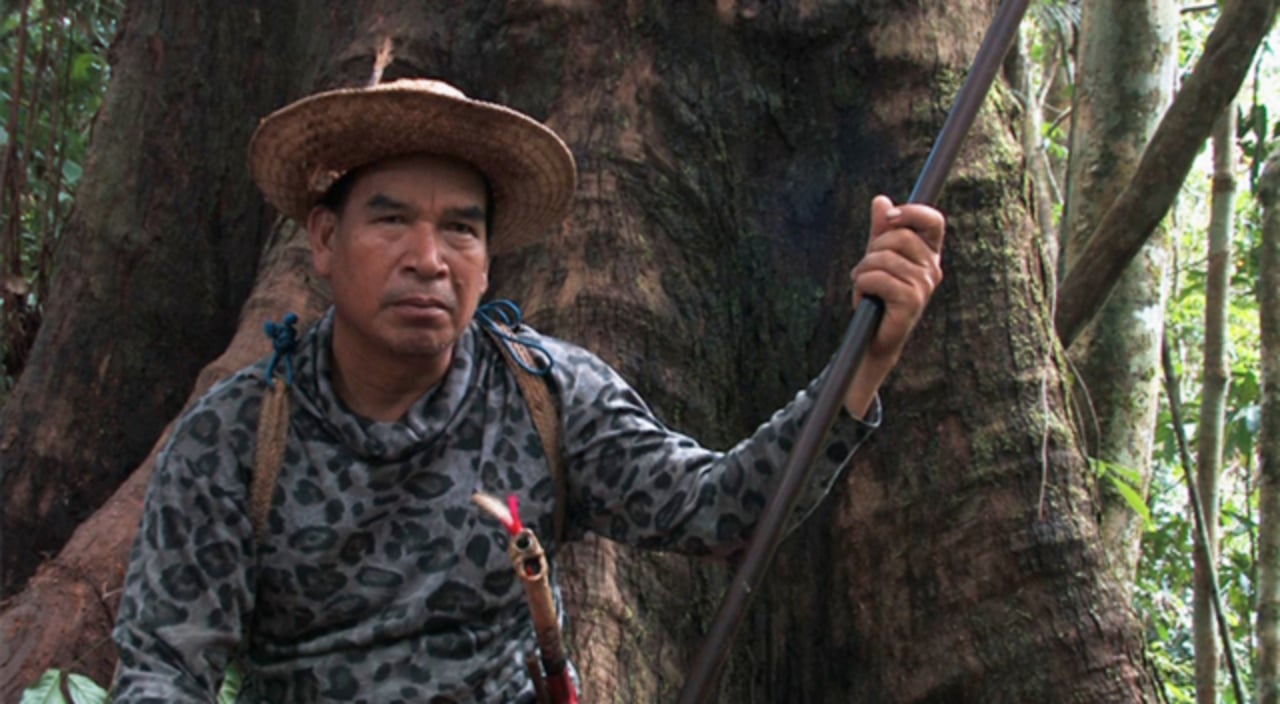Deep in the remaining old growth forests of Borneo, the Setulang Dayak village guards its forest with deep commitment. To date, the village’s traditional law of Tana Olen (forbidden forest), withstands increasing pressure from encroaching logging industries. Now as rapid development rolls in, the village is trying to secure sustainable and forest-friendly future, including a eco-tourism venture and carbon credits.
Featuring Pah Kole Adjung
Co-director/Camera/Editor: Luis Patron
Co-director/Producer/Editor: Citt Williams
Associate Producers: Setulang Village Forest Management Board
Graphics: David Jimenez
Sound Mixer: Tfer Newsome
Shot on location in East Kalimantan, Borneo, Indonesia
Duration 9:05 minutes
Developed and produced for United Nations University (UNU) by UNU Media Studio & Setulang Village Forest Management Board, in association with UNU-IAS Traditional knowledge Initiative and The Christensen Fund.
Further information for this film can be found at film’s website: http://ourworld.unu.edu/en/forbidden-forest-of-the-dayak/
United Nations University has published this work under a Creative Commons license – share alike, attribution, no derivatives, non-commercial
*About this Project*
Collaboratively made with Indigenous storytellers, these videobriefs are told in local languages, respect Intellectual Property rights and provide storytellers with media training, resources and a fair media engagement model for future projects. The final videos played alongside other international climate change videos at a locally coordinated forum event, in April 2009’s Indigenous Peoples Climate Change Summit and later at a special screening at the National Museum of Denmark during the Copenhagen COP15 meeting.
*About the filmmakers*
Luis Patron- Co-director/Camera/Editor
Luis Patron works as an independent documentary filmmaker, producer, HD cinematographer and editor. He teams up with talented local professionals in Japan and around the world to craft factual films for cinema and television.
Citt Williams- Co-director/Producer/Editor
Citt is a documentary filmmaker at the UNU Media Studio with over 12 years producing experience in broadcast media. Citt’s produced documentary films have been screened at festivals including Cannes (Yellow Fella), Sundance, Mumbai, Melbourne and by broadcasters including the Australian Broadcasting Corporation, Discovery and National Geographic. She has a Masters degree in documentary from the Australian Film Television and Radio School (Sydney) and a Business degree in Film and TV Production from QUT (Brisbane). Within UNU, her unit “Media Studio” (MS) has grounded expertise in online learning, interactive media and video production and in linking development issues with visual media and online content on social and environmental issues. Her role in the UNU-IAS Traditional Knowledge Initiative seeks to build greater understanding and facilitate awareness of traditional knowledge (TK) to inform action by Indigenous peoples, local communities and domestic and international policy makers. Key outputs include research activities, policy studies, capacity development and online learning and dissemination.
Setulang Village Forest Management Board
The village of Setulang in the Malinau District of Kalimantan is exceptionally committed to conserving their forest. There are, however, tenure disputes between Setulang and neighbouring villages who have brokered deals with logging companies. Yet, Setulang’s commitment has piqued the conservation interests of neighbouring villages. Setulang is interested in marshalling support for the continued conservation of the Setulang forest area. General goals and specific objectives: (1) implementing conservation activities in the Setulang forest area and (2) working with neighbouring villages to resolve tenure disputes the area of conserved forest and better ensure its integrity, sustainability and management. IUCN projects have provided support to three villages for forest custodianship conflict-resolution, training in livelihood options for the benefit of forest conservation, and help local villagers to communicate with local government over forest management.
United Nations University Media Studio
The UNU Media Studio was established in March 2003 and works in collaboration with a global network of partners to develop and share open educational resources. Through a small team based in Tokyo, the UNU promotes innovation in the building of interactive content and video documentaries that engage, entertain and educate. The core creative team is comprised of specialists in web and graphic design, documentary and multimedia production, as well as educational technology and instructional design. In developing projects, this team collaborates with subject matter experts from within the UNU, from other UN bodies and from partner universities. The UNU Media Studio also collaborates with independent professionals in the area of documentary production, web application development, web design and instructional design. mediastudio.unu.edu
United Nations University Institute of Advanced Studies – Traditional Knowledge Inititaive
The UNU-IAS Traditional Knowledge Initiative seeks to build greater understanding and facilitate awareness of traditional knowledge (TK) to inform action by indigenous peoples, local communities and domestic and international policy makers. Key outputs include research activities, policy studies, capacity development and online learning and dissemination. unutki.org
For more information:
Our World 2.0 ourworld.unu.edu and UNU IAS-TKI unutki.org
See related article at Our World 2.0: http://ourworld.unu.edu/en/forbidden-forest-of-the-dayak/
Also:
unutki.org/news.php?news_id=51&doc_id=7
A high resolution version of this video, and additional langauge subtitles are available. Please contact us for details:
Media Studio
53-70 Jingumae 5-chome Shibuya-ku
Tokyo JAPAN 150-8925
Ph: +813 5467 1324
onlinelearning@unu.edu
